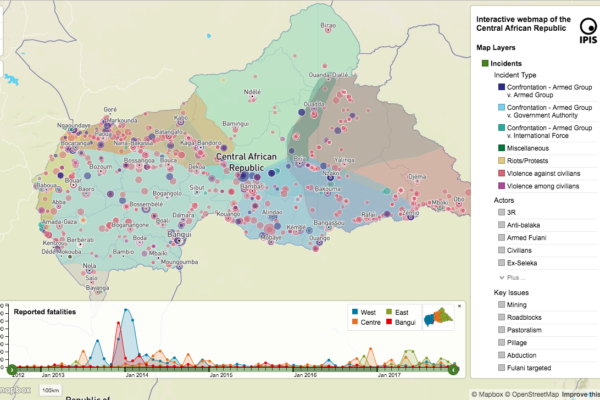
Central African Republic: A Conflict Mapping (2018)
September 16, 2018In a new report and webmap on the longstanding crisis in the Central African Republic (CAR), IPIS points out that access to resources remains the predominant driver of both armament and conflict in CAR. All armed groups operating in CAR are engaged in predation on one or more economic sectors. Such predation is not only a key determinant of an armed group’s movements and activities, but prov
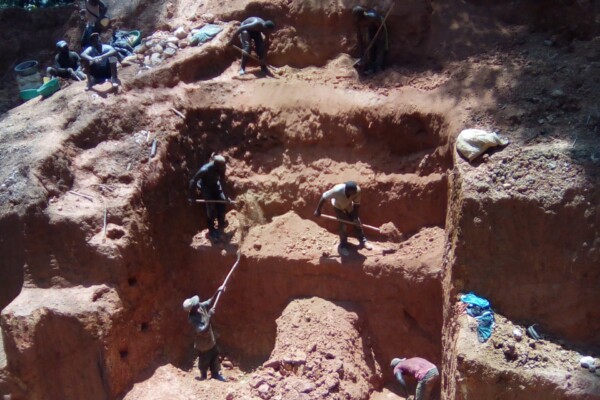
Annual Report 2017
August 21, 2018In its 2017 annual report, IPIS gives an overview of its research projects and activities. It covers the four research programmes that IPIS focusses on: natural resources, arms trade, conflict mapping and business and human rights. IPIS explains among others its mapping work of artisanal mining sites in the Democratic Republic of Congo, its work on Human Rights in mining in Northwest Tanzania an

Arms Trade Highlights May – June 2018
July 6, 2018On 8 June 2018 the Appeals Chamber of the International Criminal Court acquited the Congolese businessman Jean-Pierre Bemba from the charges of war crimes and crimes against humanity committed by the troops of his Mouvement de libération congolais (MLC) in the Central African Republic between October 2002 and March 2003. The then President of the Central African Republic, Ange-Félix Patassé, had c
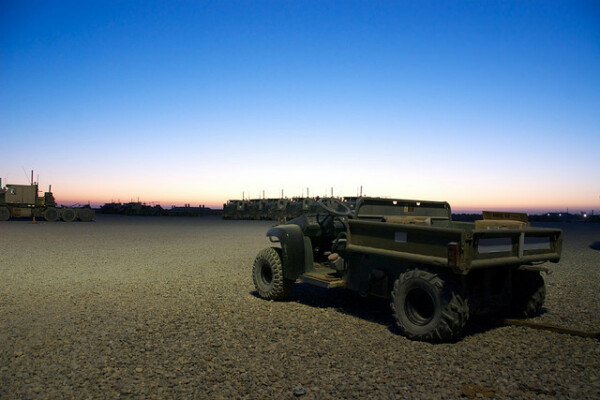
Arms Trade Highlights March – April 2018
May 8, 2018This briefing on arms trade demonstrates once again how arms or military technology and equipment are exported from European countries to countries where, arguably, they can contribute to serious human rights violations or violations of International Humanitarian Law (IHL). Some of these transfers are challenged by civil society. On 12 April the Campaign Against Arms Trade (CAAT) was at the Court
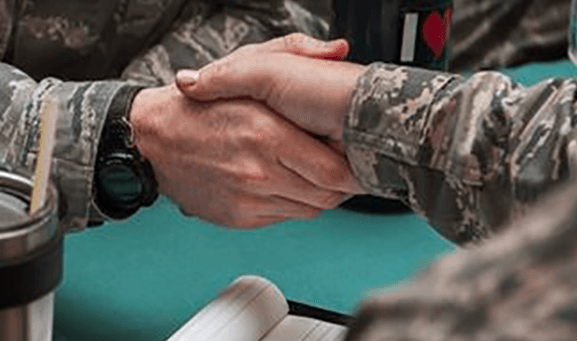
Arms Trade Highlights: January – February 2018
March 9, 2018The Arms Trade Treaty (ATT) is entering its fourth year. For signatories to the ATT, its implementation and translation into national laws often remains a challenging work-in-progress. Others, like Canada, have plans to accede to the ATT. For a thorough legal and practical analysis of the ATT, we like to remind you of the book “Weapons and International law: The Arms Trade Treaty”, published by La
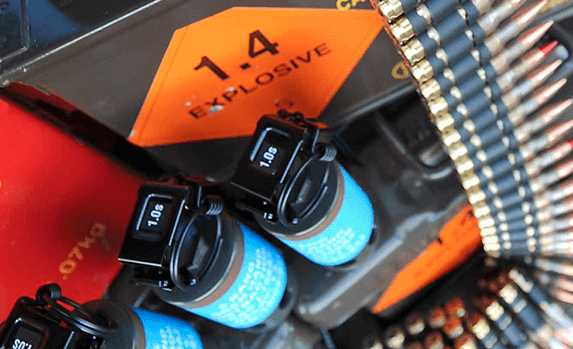
Arms Trade Highlights: November – December 2017
January 19, 2018Data interpretation: a cautionary tale As much as strong datasets are a prerequisite for strong interpretations, the framework used to interpret data is equally important. Which contextual factors are considered or not, which definitions applied or thresholds used will strongly impact the message that will emerge, especially out of complex, geo-political settings. An in-depth knowledge and conside
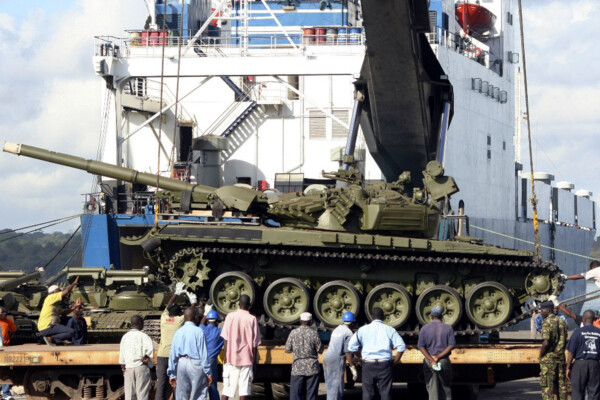
Arms Trade Highlights: August – October 2017
November 6, 2017Arms Trade Treaty UN’s Arms Trade Treaty ‘too weak to make a difference’ | 11 September 2017 | DW Diplomats from over 100 countries met in Geneva, Switzerland on Monday to discuss why the United Nations’ landmark Arms Trade Treaty (ATT),which came into force three years ago, has so far failed to stop the flow of weapons to the world’s war zones. Celebrated as a paradigm shift in the regulation of
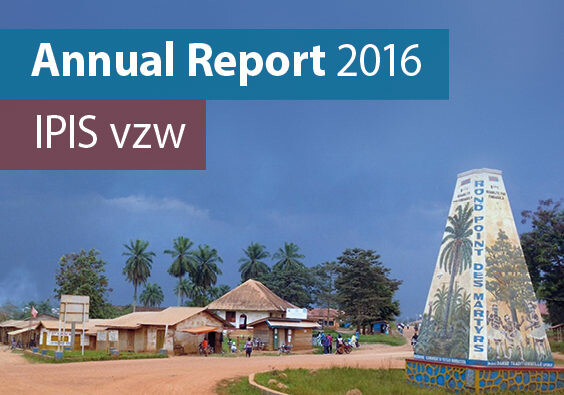
Annual report 2016
June 23, 2017In its 2016 annual report, IPIS gives an overview of its research projects and activities. It covers the four research programmes that IPIS focusses on: natural resources, arms trade, conflict mapping and business and human rights. In 2016, IPIS continued to be a rally point for hard to get data on natural resources, often visualised in maps. Our flagship map for 2016 is the interactive map of art
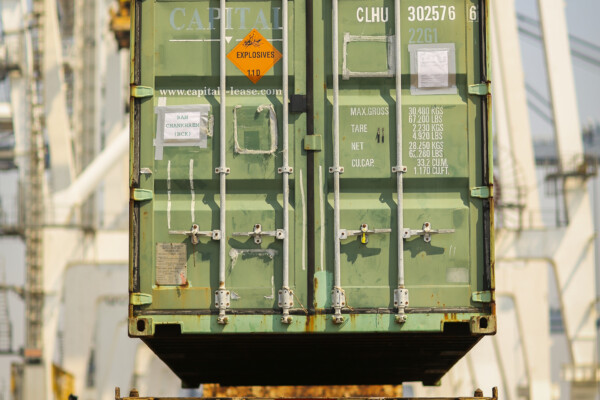
Optimalisatie van het wapenhandeldecreet en wapenhandelbesluit: advies van IPIS en Amnesty International Vlaanderen
June 22, 2017In maart 2012 publiceerden Amnesty International Vlaanderen en IPIS een nota met analyse en aanbevelingen bij het ontwerp van decreet “betreffende de in-, uit-, doorvoer en overbrenging van defensiegerelateerde producten, ander voor militair gebruik dienstig materiaal, ordehandhavingsmateriaal, civiele vuurwapens, onderdelen en munitie”. Het uiteindelijke ‘Wapenhandeldecreet’ van 30 juni 2012 schi
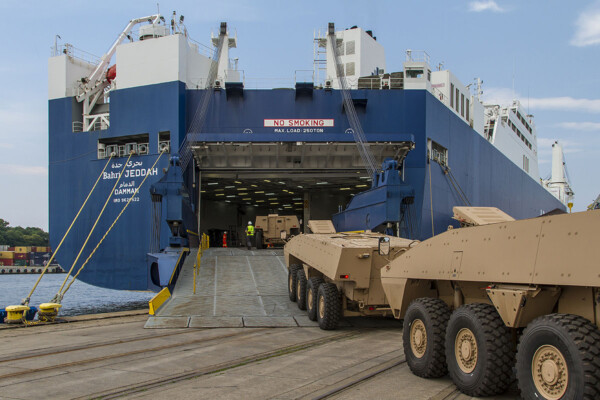
Arms Trade Highlights: March – May 2017
June 15, 2017IPIS Publications Fatal Freight: Ships, Guns and Human Rights Abuses TransArms and IPIS undertook a thorough research of the responsibilities of states and companies involved in the transfer of military equipment by sea under customary international law. The maritime transport is by far the main modality for the transfers of military equipment and commodities. The report considers cases of irrespo
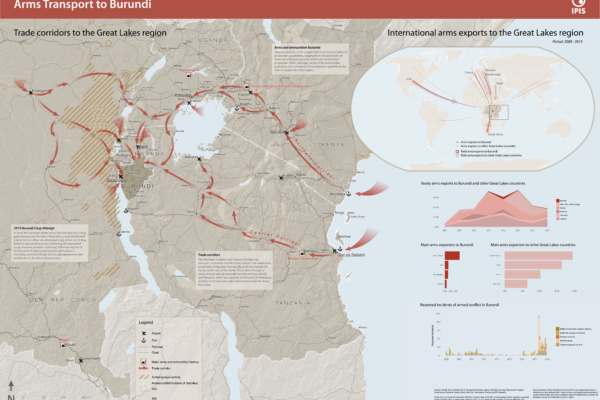
Arms Trade Corridors to Burundi
May 5, 2017Burundi has seen a period of unrest following the failed coup d’état by a Burundian general in May 2015. In order to better understand the situation, IPIS drafted a new map entitled ‘Arms transport to Burundi’, which puts the 2015 unrest in the geographical perspective of the Great Lakes region and in the relevant timeframe covering 2008 to 2015. The map highlights two important factors in the rec
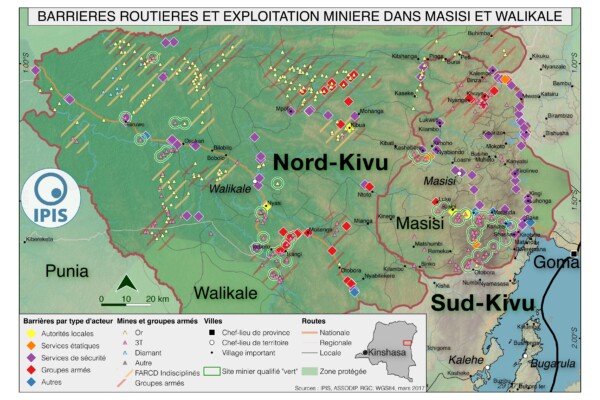
Pillage route: l’économie politique des barrages routiers à Walikale et Masisi (2017)
March 31, 2017French version below – version française ci-dessous Roadblocks are a ubiquitous phenomenon in Eastern Congo. In an effort to map the scope of this phenomenon as well as its significance in the political economy of conflict, IPIS has embarked on a collaboration with the Danish Institute for International Studies. The point of departure is that control over the circulation of people and valua
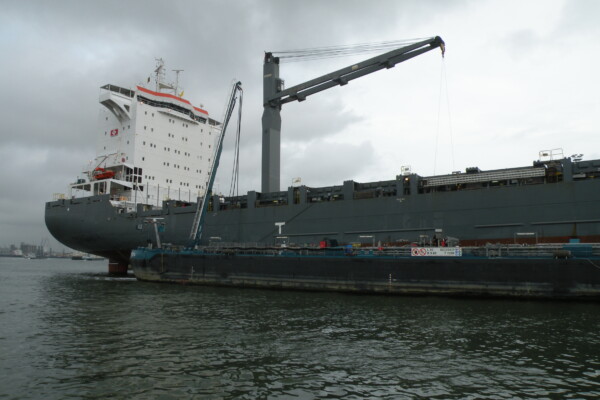
Arms Trade Highlights: January – February 2017
March 23, 2017On 17 January 2017, a four-year investigation by the UK Serious Fraud Office (SFO) into 30 years of bribery and corruption on a global scale (Angola, UK, United States, Brazil, India, Indonesia, Thailand…) by Rolls-Royce PLC came to an end. The investigation will continue into the conduct of individuals. The SFO entered into a Deferred Prosecution Agreement (DPA) with Rolls-Royce following appro
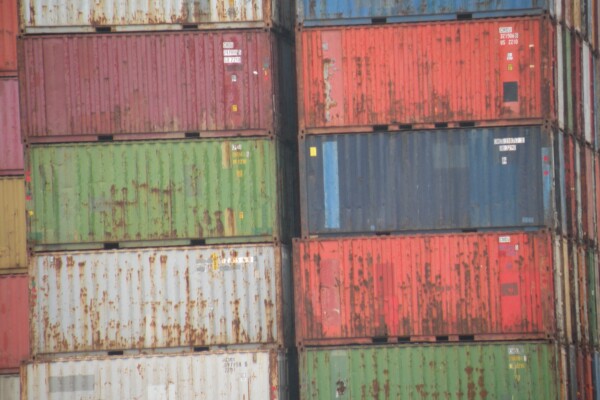
Arms Trade Highlights: November – December 2016
January 19, 2017In our last Arms Trade Bulletin, we reported on a Canadian-owned company (Streit Group) that had allegedly sold armoured vehicles from its UAE factory to Sudan in contravention of UN and Canadian embargoes . It was reported that the same company had also sold vehicles to South Sudan, although Streit claimed that those vehicles were not military, and the end user of the vehicles was not present on
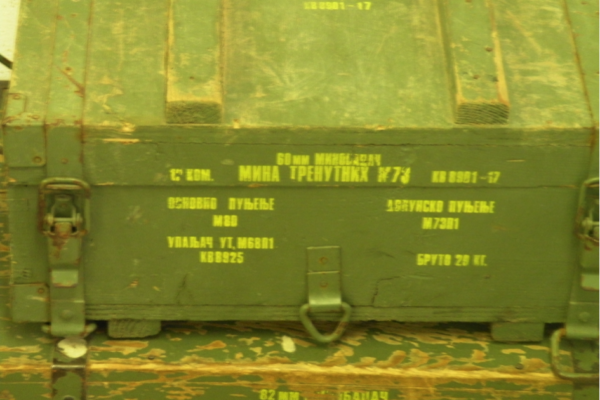
Arms Trade Highlights: September – October 2016
November 16, 2016In Brazil two former executives of arms company Forjas Taurus are accused of diverting 8,000 small arms in 2013 to Yemen. The prosecutor claimed that the defendants committed fraud by disguising the final destination of the weapons, and also tried to hide the identity of the arms broker. The arms broker Fares Mohammed Hassan Mana’a had been put on a UN sanctions list in 2010 for violating the UN a
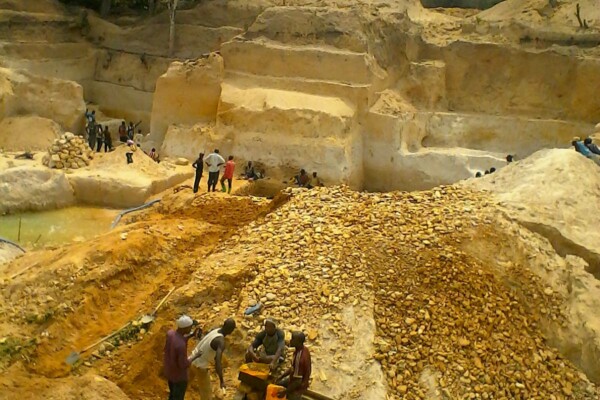
Annual Report 2015
August 31, 2016Download pdf or open with issuu reader http://issuu.com/ipisresearch/docs/2016_10_10_ipis_jaarverslag_2015_20
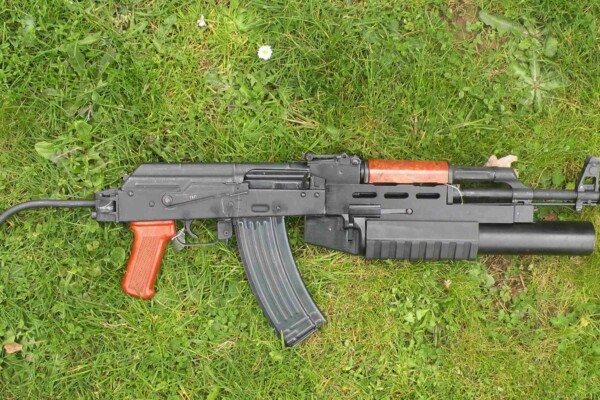
Arms Trade Highlights: July 2016
August 19, 2016The present editorial is inspired by our recent experience at a European arms control event where we witnessed German arms officials seeking to whitewash Germany’s arms export policy. The double standard revealed by said officials is exemplary of the discrepancy between words and deeds as regards national arms export controls. Although far from being the only European country that can be blamed fo
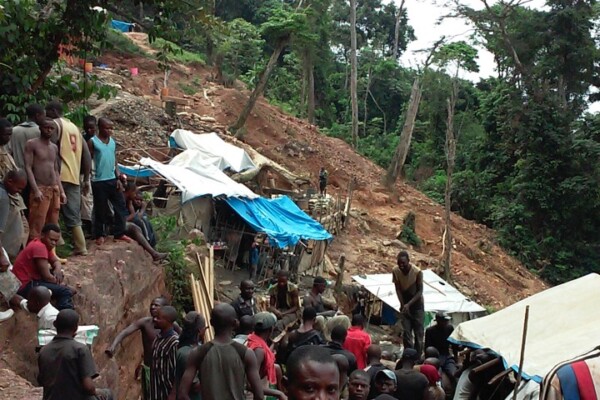
Third Party Review of the Bisie Security Report
July 19, 2016The so-called ‘Bisie Mineral Stock’ encompasses about 1,000 tons of cassiterite, extracted by artisanal miners at Bisie mines between November 2010 and June 2015. A number of bans on mining and mineral trade in this region, as well as some hesitance further down the supply chain to buy untagged minerals, meant that mineral production was not marketed, but stored in warehouses. From 2014 onwards, n

Arms Trade Highlights: May – June 2016
July 7, 2016THERE IS NO ‘MR BIG’ by Brian Johnson-Thomas Hush – Terrorists get their weapons from governments…… Every so often one or other of us gets a phone call from some excited TV documentary producer or magazine journalist wanting to do a really big number on the, presumably, secretive villain who supplies the guns and ammunition to the likes of the Islamic State and Al Quaida wherever they happen to be

Arms Trade Highlights: March – April 2016
June 1, 2016This edition of IPIS’ Arms Trade Bulletin highlights two international arms transfers that continue to create a stir in arms-related media coverage. These are namely, the Heckler & Koch arms deal with Mexico – inquiry into which has seen German journalists fall into the cross hairs of prosecuting authorities –, and the Franco-Saudi-Lebanese arms deal. Mimicking the Turkish handling of journali

